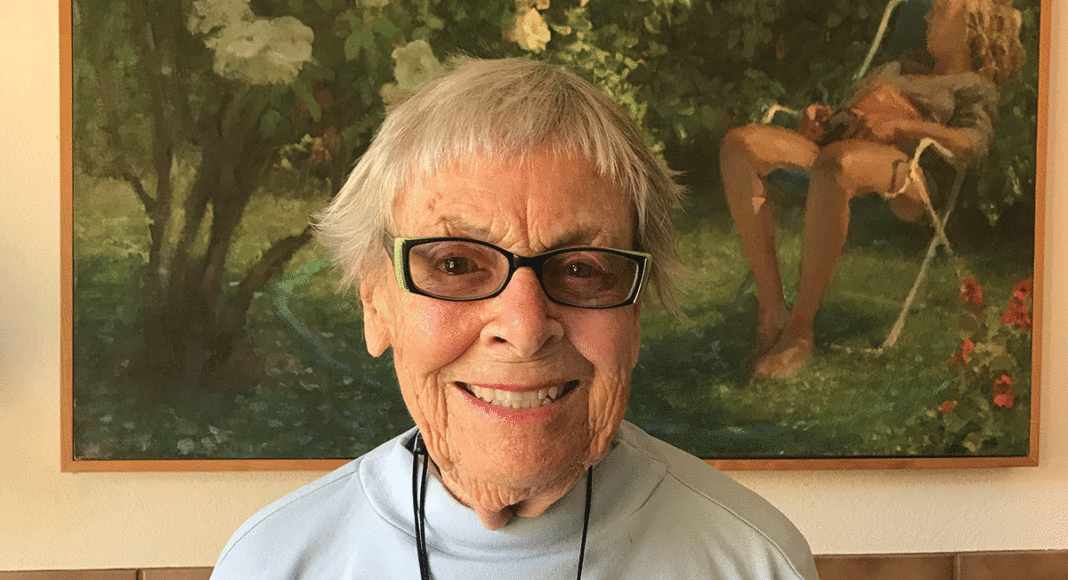In the audience for rehearsals of this season’s The Winter’s Tale sat a familiar figure, a petite woman whose experience with this, one of Shakespeare’s last plays, is intimate and familiar. She was of course Audrey Stanley, who founded Shakespeare Santa Cruz back in 1982, and who still attends each opening night of the festival now reborn as Santa Cruz Shakespeare.
“I love watching something grow, seeing what the others have done,” she tells GT. Such enjoyment of another company’s work is refreshingly generous for someone whose life has been a series of theatrical milestones: the first woman to direct Shakespeare at the celebrated Ashland Festival in Oregon; founder of England’s University of Bristol Dramatic Society Touring Company; first tenured professor of theater arts at UCSC; the first actor to play Puck sitting in a swing high overhead the Redwood Glen.
Stanley became famous for her meticulous framing of The Winter’s Tale at Ashland—framing that heightened the play’s unique structure and mythic motifs. Echoing the myth of Hades and Persephone, the play begins in the winter created by a rift in the friendship between two kings. In Greek mythology, Hades kidnaps Persephone, the goddess of the harvest. Her mother Demeter plunges the land into perpetual winter, and only when Persephone is allowed to leave Hades does springtime return, bringing fertility and abundance. And love.
Shakespeare’s version creates a radical split between winter, occurring in King Leontes’ Sicily, and springtime in King Polixenes’ Bohemia. The tale is separated by a sudden flash-forward 16 years, the only time such a temporal leap occurs in all of Shakespeare. The contrast, which reflects the sudden jealousy of King Leontes, and his subsequent banishment of his wife Hermione, requires our complete surrender to the depth of the characters’ pain. Only then will we be able to embrace the pastoral playfulness of the play’s second half, with a bit of magic at the end.
Stanley’s 1975 version of the production stressed the play’s “three worlds” within these two halves. The first, “a tragedy of sexual jealousy,” as she calls it, in Sicily, then the “strong rural comedy” of Bohemia 16 years later, and finally a stunning redemption back in Sicily. When asked today to characterize The Winter’s Tale, Stanley immediately responds: “Tragedy and comedy, the lot! It has everything.” And so the tough job of the director is to “maintain unity while still moving the action forward.”
Stanley’s own narrative begins with her childhood in Whitstable, Kent, and London, where she was first introduced to theater through pantomimes at a young age. Asked when she knew that her life would be in theater, Stanley recalls that she began “as a child of 5, directing and acting, both at the same time. I organized my friends and we gave a performance on the beach.” In an oral history with Cameron Vanderscoff, she recalled, “We had a very enterprising young English teacher who took us up to London on the milk train at 6:00 in the morning to sit outside the Old Vic Theater and attend performances there. So I saw early Laurence Olivier and Alec Guinness in plays. It just was very natural to me to do that.” The theater company she started at the University of Bristol is still going strong today, she notes with pride.
From Bristol to Canada, Colorado and finally San Francisco, Stanley acted and directed her way west, where she worked on her PhD in Dramatic Art at UC Berkeley while teaching at UCSC’s emerging Theater Arts program in 1969. The death of her colleague C.L. Barber kickstarted the desire to establish a Shakespeare festival on the UCSC campus. Did she suspect the festival would be a success? “Of course. I never doubted.” With a chuckle, she quickly adds that her co-conspirator Karen Sinsheimer (wife of then-UCSC Chancellor Robert Sinsheimer) helped make it happen: “We were like two war horses with a runaway chariot.” She smiles broadly at the memory. “Karen organizing the board of directors, and me doing the practical things,” Stanley recalls. Those practical things involved bringing in former London colleagues Tony Church and Julian Curry, both Royal Shakespeare Company actors. Thanks to the ACTER program, which brought actors in residence from England to U.S. universities, others happily followed—including Patrick Stewart and Paul Whitworth. “The Royal Shakespeare Company actors raised the game for local actors,” she recalls.
Stanley says the current production of The Winter’s Tale interests her. Is this play a particular challenge? I ask. “An actor—a good one—can convince the audience of anything,” she laughs. The woman who brought Shakespeare to Santa Cruz still can’t get enough theater. “When I visit England, I like to have my fill of theater,” she said with twinkling eyes. “Sometimes three plays in one day!”













